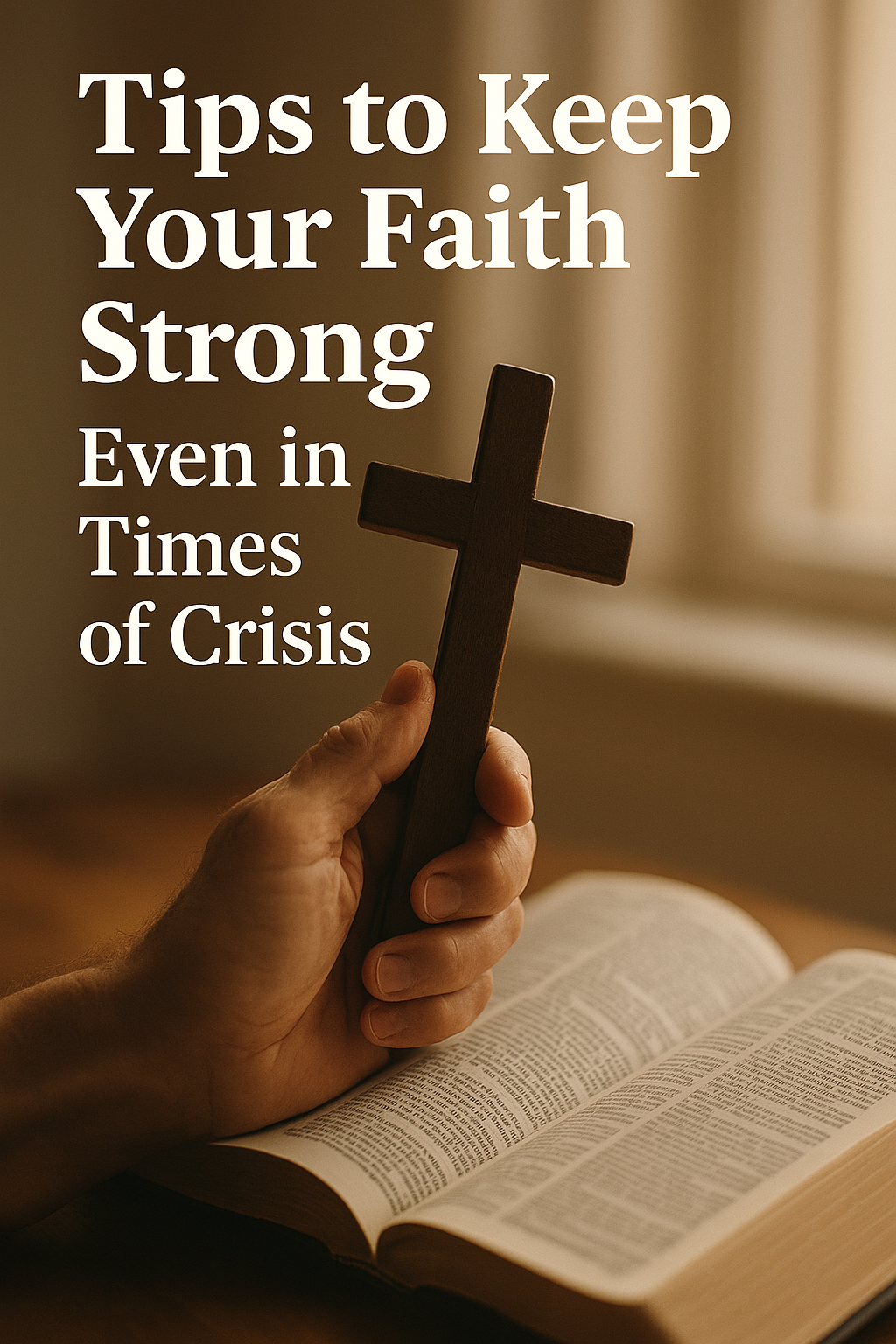When life feels uncertain, and storms seem unending, holding on to faith can be one of the greatest challenges for a believer. Whether you’re facing personal loss, financial hardship, illness, or global turmoil, the temptation to doubt God’s presence and purpose is real. But the good news is: God remains constant, even when everything else is shifting.
Here are practical and biblical tips to help you strengthen your faith during difficult times.
1. Be Honest with God
Crisis moments often bring confusion, anger, and sadness. Don’t feel like you have to hide your emotions from God — He already knows them. Pour your heart out to Him in prayer. Look at the psalms of David: many of them are raw, emotional, and filled with questions, but they always return to trust in God.
“Trust in him at all times, you people; pour out your hearts to him, for God is our refuge.” – Psalm 62:8
Being real with God invites Him to meet you in your weakness and restore your strength.
2. Stay Connected to Scripture
When your emotions feel overwhelming, the truth of God’s Word becomes your anchor. The Bible is full of stories of people who endured hardships but remained faithful — like Job, Joseph, Ruth, and Paul. Their lives remind us that God’s faithfulness doesn’t disappear in crisis.
Here are a few powerful verses to meditate on:
- Isaiah 41:10: “So do not fear, for I am with you…”
- Romans 8:28: “In all things God works for the good of those who love him…”
- Psalm 34:18: “The Lord is close to the brokenhearted…”
Try reading Scripture out loud or writing verses on sticky notes to keep around your home.
3. Surround Yourself with Faith-Filled People
In times of hardship, isolation can be dangerous. Community offers encouragement, support, and spiritual strength. Stay connected with your church, small group, or Christian friends — even virtually. They can pray with you, speak truth into your life, and help carry your burdens.
“Carry each other’s burdens, and in this way you will fulfill the law of Christ.” – Galatians 6:2
Don’t underestimate the power of others walking with you in faith.
4. Keep a Gratitude Journal
Gratitude is a powerful spiritual discipline. Even in the darkest seasons, there’s always something to thank God for — the breath in your lungs, a kind word from a friend, a moment of peace. By writing down these blessings, you shift your focus from problems to promises.
This doesn’t mean ignoring your pain, but choosing to see God’s hand even through it.
“Give thanks in all circumstances; for this is God’s will for you in Christ Jesus.” – 1 Thessalonians 5:18
5. Pray Even When It’s Hard
Sometimes, prayer feels dry or painful during a crisis. But don’t stop. Even a simple cry of “Help me, God” is powerful. Prayer keeps your relationship with God alive and open. It invites His peace into your situation and helps guard your heart from bitterness or hopelessness.
Jesus Himself prayed in agony in the Garden of Gethsemane — not with perfect composure, but with sincerity and surrender.
“Cast all your anxiety on him because he cares for you.” – 1 Peter 5:7
6. Focus on God’s Character, Not Your Circumstances
Your faith will be tested when you can’t see what God is doing. That’s when you have to remember who He is: faithful, good, merciful, and sovereign. Even if you don’t understand the why, you can trust in the Who.
Keep a list of God’s attributes — His love, wisdom, patience, justice — and meditate on those when your surroundings feel unstable.
“Jesus Christ is the same yesterday and today and forever.” – Hebrews 13:8
7. Worship Through the Storm
Worship isn’t only for times of joy — it’s a weapon in times of crisis. Singing praises, even with tears, invites God’s presence and reminds your soul of His greatness. Many breakthroughs in Scripture were preceded by praise (see Acts 16:25-26).
Put on worship music that uplifts your spirit and declare truth over your situation.
8. Limit Voices That Fuel Fear
It’s wise to stay informed, but constantly consuming bad news, fear-based content, or negative conversations can drain your faith. Balance your media intake with spiritual nourishment. Read the Bible more than you scroll the news. Listen to sermons more than you watch panic-driven commentaries.
Feed your faith, not your fear.
9. Reflect on God’s Past Faithfulness
Look back on moments in your life when God showed up — even if things didn’t go as planned. Remember the prayers He answered, the peace He gave, or the ways He carried you through past storms. Journaling these testimonies builds your confidence in Him for the future.
“I will remember the deeds of the Lord… I will meditate on all your works.” – Psalm 77:11-12
If He was faithful before, He will be faithful again.
10. Accept That Faith Is a Journey
Having strong faith doesn’t mean never doubting. It means choosing to believe even when doubt whispers. God honors your steps of trust — even if they feel shaky. Growth often comes through the wrestle.
Take things one day at a time. Some days you’ll feel stronger, others more fragile. But don’t give up.
“Though the mountains be shaken and the hills be removed, yet my unfailing love for you will not be shaken…” – Isaiah 54:10
Keep Holding On
No season lasts forever, and no pain is wasted in the hands of God. He sees your tears, hears your prayers, and walks with you through every valley. Strengthening your faith in crisis isn’t about denying your emotions, but anchoring them in God’s truth.
When you cling to Him — even with trembling hands — you are building a faith that lasts. Keep seeking. Keep praying. Keep worshiping. One day, you’ll look back and see how He carried you through.

